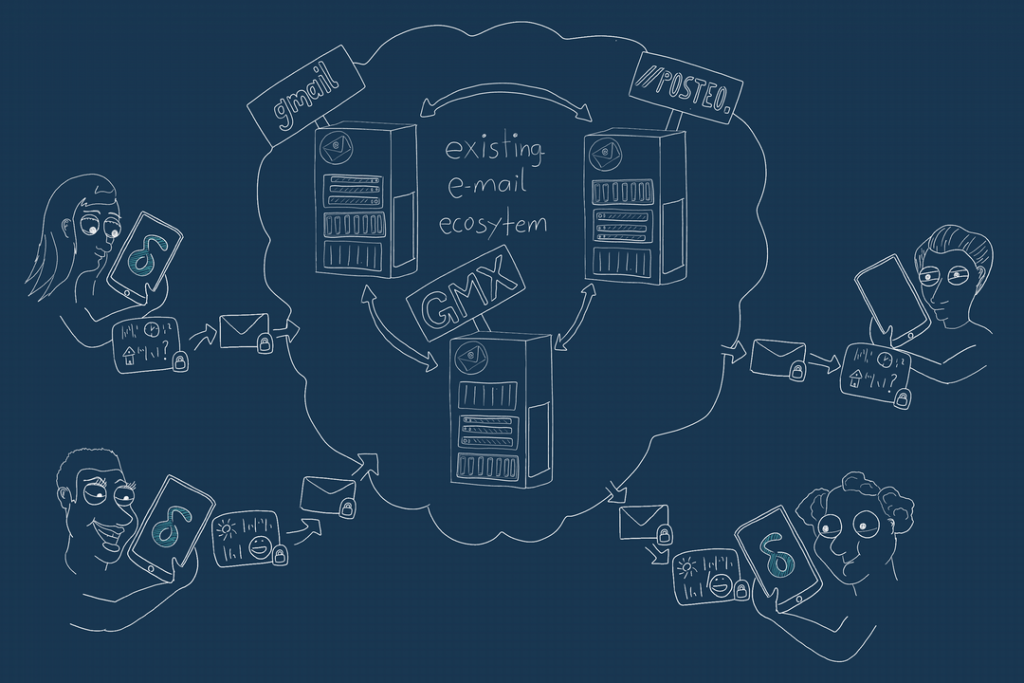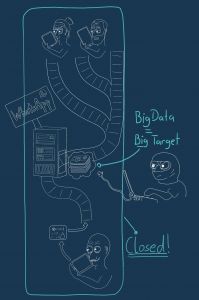 Delta Chat is an instant messenger application like Telegram or WhatsApp, but without the tracking or central control. Delta Chat app does not have dedicated servers, does not need your phone number and functions via the e-mail server network. Holger Krekel explains how NGI helped make Delta Chat even more innovative with the evolving chat bot ecosystem. Delta Chat is an innovative young project. It employs a pragmatic approach to decentralised messaging. Delta Chat App is available for Android and IOS.
Delta Chat is an instant messenger application like Telegram or WhatsApp, but without the tracking or central control. Delta Chat app does not have dedicated servers, does not need your phone number and functions via the e-mail server network. Holger Krekel explains how NGI helped make Delta Chat even more innovative with the evolving chat bot ecosystem. Delta Chat is an innovative young project. It employs a pragmatic approach to decentralised messaging. Delta Chat App is available for Android and IOS.
What drives you?
My motivation to work in tech is to preserve and re-incite decentralized, resilient systems with good outcomes for users. The tech space, and in particular software development, is often very frenetic. My nine-year-old son helps me focus on family life beyond this frenetic world. I also repeatedly engage in anthropology and philosophy which helps me to think differently about what I do and what is happening. Technology will not save us; and we need approaches which include non-humans, like insects, trees and animals if humans want to survive and have good lives.
What is innovative with Delta Chat?
The biggest difference between Delta Chat and other messengers is that it uses the massive existing e-mail server network to relay messages. That means that your communication is as secure as your choice of e-mail provider – which is something you should be very careful about anyway, not just for your own privacy but even more for that of the people you communicate with. Delta Chat App communicates directly between your server and the server from the person you communicate with, so once you choose a secure e-mail provider – like a trusted hosting company nearby – you can be sure your communication is well protected.

Other popular messaging apps are also designed around well-resourced people who have an online connection all the time, that is not the case for most of the rest of the world. We have so far built a diverse user community in many countries, inside of Europe but also globally. These are privacy conscious people, but also people situated in constrained environments. If you can set up an e-mail client, you can use Delta Chat.
For example, we have a long-standing collaboration with a developer in Cuba and there are probably 20 – 30,000 people in Cuba using Delta Chat. Most Cubans are economically barred from the Internet, it is expensive, due to US sanctions. Cubans can get an affordable mobile data plan for the intra-island network, and can use Delta Chat App via their e-mail server, so chat is available at an affordable price, which none of the other messenger apps can offer. Several Cubans help testing Delta Chat apps before they are released to Google Play and Apple Store. Interestingly, they are more interested in efficiency and less in the standard end-to-end encryption. Delta Chat’s end-to-end encryption originates in another H2020-funded project, Autocrypt.
 For another example, Delta Chat is gaining traction in Russia because privacy is guaranteed. In April 2020, we received a request from Roskomnadzor, the Russian ICT authority, to provide access to Delta Chat user data and register with their state-run provider registry. We declined for the simple reason that Delta Chat developers have no access to user data whatsoever.
For another example, Delta Chat is gaining traction in Russia because privacy is guaranteed. In April 2020, we received a request from Roskomnadzor, the Russian ICT authority, to provide access to Delta Chat user data and register with their state-run provider registry. We declined for the simple reason that Delta Chat developers have no access to user data whatsoever.
Describe your innovation, achieved with NGI support
NGI Zero supported us to produce Delta Bot, frameworks for writing Chat bots in Python or Javascript. One major outcome is a decentralized authentication bot that can be easily integrated with standard Web software. It allows to login into a website like the Delta Chat support forum by scanning a QR Code. You can use your phone to login quickly, no passwords necessary. The most important advantage is in terms of privacy. Rather than using a username and a password, or using a centralized login via Facebook or GitHub (Microsoft) “login with Delta Chat” is just between the Website, the Login-bot and the Delta Chat app. No central services are involved.
NGI helped kick-start the bot ecosystem and we currently have around 10,000 users – (around 100,000 users for Delta Chat with 90,000 Android downloads, but as there is no central platform it is difficult to count who is still using it). Delta Bot is widely deployed in Cuba where many people use it for playing games or to have a Delta Chat Facebook Messenger conversation – in total privacy and without using up a lot of their mobile data plan. It is still highly experimental but certainly one of the more interesting developments.
What’s your experience of NGI?
The development community is about a dozen active people – we heard about the NGI opportunity, made a proposal and were accepted. As with other proposal-based funding mechanisms, it is difficult to commit to tangible results a year in advance, because it depends who shows up and what the order of the day will be. Also, we rely on the community for several aspects of development and it is not possible to pay everybody. We like to support newcomers even if it means that some original plans have to change. With NGI we found a good degree of dynamism and flexibility.
NGI is less bureaucratic than other EU funding programmes. Although, I did already have experiences with EU agile funding for open-source development back in 2005, I found NGI Zero were well organized very supportive, with the best proposal-handing communication I’ve seen. They explained the set up and introduced how it works, with very clear instructions on the need give feedback.
Holger Krekel is the Founder and Managing Director of merlinux, a limited company in Freiburg, Germany, which channels money to contributors.
For more information on Delta Chat bots: https://bots.delta.chat/

